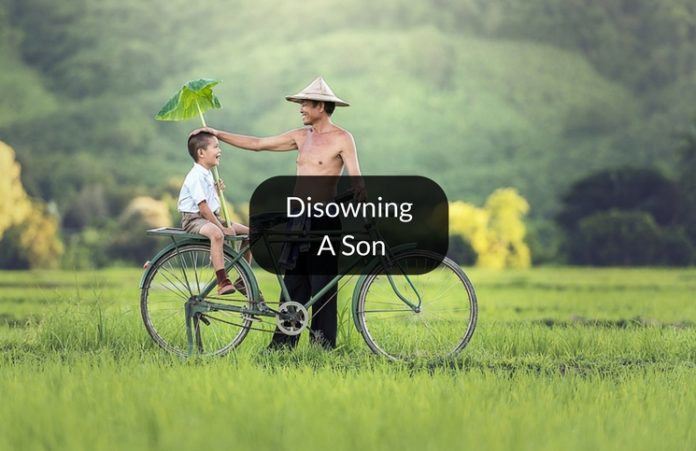This article is written by Rishabh Pandey from Guru Gobind Singh Indraprastha University, New Delhi.
Introduction
Despite how pious the relationship between parents and their child is, challenging circumstances may arise leading to disputes. Even if after several attempts of resolving the conflict, it does not seem to be an option to carry on the relationship, you may feel the need to sever your ties with your once very beloved son. This article discusses whether you can disown your son or not, and if you can, what rights will he still have in the ancestral property.
Disowning a Son
● Disowning in General:
‘Disowning’ a son is not recognized per se by the Indian legal system. In fact, the term in itself has a very wide scope. Disowning may be in respect to not having any moral relationship with the son; it may have to do with not wanting to maintain the child anymore; it may be done to safeguard oneself from the creditors of the son; or it may be to disinherit the son from your property.
As far as moral obligations are concerned, you may or may not feel the necessity to be obliged to perform them. However, legal obligations towards your son are must to be abided by. For example, you cannot disown a minor child and escape from paying him maintenance under Section 125 of the Code of Criminal Procedure, 1973.
No statute in India makes parents liable to pay the debt incurred by their son who has attained the age of majority. Therefore, you don’t need to take any ‘legal’ step to protect yourself. It is however prevalent and advised that you publish, in two local newspapers which are widely distributed in your area, that you are severing your ties with your son.
Such proclamation in the newspaper doesn’t have a dispositive legal effect, breaking all legally relevant familial ties.[1]This is a mere gesture to make the public aware of your intentions and sometimes to also warn them from giving any loan to the son.
● Disowning With Respect to Property:
The real legal question here is, whether you can disown your son from your property or not. A person may have two kinds of property:
- Ancestral Property: Property inherited by a Hindu from his father, father’s father or father’s father’s father, is ancestral property.[2] In the words of the Hon’ble Supreme Court of India, “Ancestral property means, as regards sons, property inherited from a direct male lineal ancestor, and as regards collaterals, property inherited from a common ancestor.”[3]
- Self Acquired Property: Any property that is acquired by a person himself, either by the means of his own resources, or through a division of ancestral property, or what he acquires as a legal heir, or through a gift deed or a testamentary document such as ‘will’ etc. is his self acquired property. A property inherited by a person from a brother, uncle, etc. is also a self acquired property.
Right of a son in both the kinds of properties are discussed below.
Right of the Son in the Father’s Self Acquired Property
Defining what self acquisition is, Yagnavalkya says that “whatever is acquired by the coparcener himself without detriment to the father’s estate as present from a friend or a gift at nuptials, does not appertain to the co-heirs.“
If the property is self acquired by the parents, a son has no legal claim in it. You can bequeath your property to anyone you wish to, by the means of will, or you may gift it to any person by a gift deed.
In a recent judgement of Delhi High Court, Justice Pratibha Rani has stated that a son has no legal right in the self-acquired property of his parents, unless he has a proof of his contribution towards the acquisition of the property.
He may be allowed to use the property on permission from his parents, but they are not obligated to allow him to live there.[4]
She further added, “Where the house is a self-acquired house of the parents, a son, whether married or unmarried, has no legal right to live in that house and he can live in that house only at the mercy of his parents up to the time the parents allow.”
Therefore, you may not only not leave your property to your son, but you can also disallow him from residing at your self acquired house.
It should be noted that if parents die intestate, the son, no matter how poor his relationship was with the parents, will have succession rights in the self acquired property of the parents.[5]
Right of the Son in the Ancestral Property
Each son, right from his birth, gets an interest in the ancestral property equal to and independent of his father.[6] The son can assert this equal right with the father only when the grandfather’s property has devolved upon his father and has become ancestral property in his hands[7].

Therefore, any will disposing of the ancestral property along with self acquired property is invalid. In simple terms, a son cannot be excluded from the ancestral property. The intention of the father to disown his son is immaterial.
To find out whether a property is or is not ancestral in the hands of a particular person, not merely the relationship between the original and the present holder but the mode of transmission also must be looked to; and the property can ordinarily be reckoned as ancestral only if the present holder has got it by virtue of his being a son or descendant of the original owner.[8]
A grandson doesn’t have any claim on the grandfather’s self acquired property. If the grandfather executes a gift deed to transfer the property to his son, the grandson cannot claim the property by contending it to be an ancestral property. Here the son doesn’t receive the property by virtue of his being a son, but because the father wants to give him a gift. The property no longer remains to be an ancestral property merely because it was obtained from the grandfather.[9]
Moreover, a son not only has an equal right as the father on the ancestral property, but the coparcenary property as a whole.
Coparcenary property means and includes:
- Ancestral property
- Acquisitions made by the coparceners with the help of ancestral property
- Joint acquisition of the coparceners even without such help provided there was no proof of intention on their part that the property should not be treated as joint family property
- Separate property of the coparceners thrown into the common stock[10]
He cannot be excluded from it, regardless of the father’s wishes.
Conclusion
There is no concept of disowning a son in Indian legal system. It is immaterial, whether a father wants to or not, he has to maintain his child until he reaches the age of majority. With respect to the property law, a son may be disinherited from the self acquired property of the father, but he will still have equal rights as the father over the ancestral or the coparcenary property of the Hindu Undivided Family.
What are your views on this? Feel free to comment below & share the article.
LawSikho has created a telegram group for exchanging legal knowledge, referrals and various opportunities. You can click on this link and join:
https://t.me/joinchat/J_
Reference:
[1] Preeti Satija vs. Raj Kumari and Anr C.M. APPL.4236/2012, 4237/2012 & 5451/2013
[2] U.R.Virupakshaiah vs Sarvamma & Anr, Civil Appeal No. 7346 OF 2008, Arising out of SLP (C) No. 11785 OF 2007
[3] Maktul vs Mst. Manbhari & Others, 1958 AIR 918, 1959 SCR 1099
[4] Sachin & Anr v. Jhabbu Lal & Anr RSA 136/2016 & CM No. 19123/2016
[5] Supra Note. 1
[6] Madanlal Phulchand Jain vs State Of Maharashtra And Ors, 1992 AIR 1254, 1992 SCR (2) 479
[7] C. N. Arunachala Mudaliar vs C. A. Muruganatha Mudaliar 1953 AIR 495, 1954 SCR 243
[8] Ibid.
[9] Ibid.
[10] Amit Johri vs Deepak Johri & Ors. DEL HC 2014, RFA (OS) No. 23 of 2013
 Serato DJ Crack 2025Serato DJ PRO Crack
Serato DJ Crack 2025Serato DJ PRO Crack










 Allow notifications
Allow notifications



If a mother and father disowned his daughter through a public notice and the mother dies intestate that is without a “WILL”,then the disowned daughter claims his share in properties(Ancestral and self acquired) Father is alive.
Plz reply with any judgement.
If father during his lifetime treated his son carelessly and not spent adequate money on his son education and in stead invested money in constructing house and son is not settled down in life because of no professional degree
Can mother disown a child in absence of father/after death of father. If that child (Age 50) is not maintaining his parents and making parents life a hell.
Who is second owner of the self acquired property of a husband after death of husband ?
If the owner of the property is father and he is dead. In that case, the property will be equally divided among all the childrens (including girls) and the mother. Mother can not disown the child from whole property. You may call me at 7906184785. I had faced a similar situation and trying to deal with it. I am not a lawyer but may be i can guide you. Or get some help from you. Stay happy.
An adopted son right from a few months old to his mother and deceased father now son is 35 yrs old can be denied to property acquired by deceased father, by mother in her will to give the said property to her neice because the son has spent all the money of his father when alive with father’s consent and still living in the house. Can the living mother do such a will that after her death her house be assigned to her neice leaving her son nothing. Please advise.
Hello,
This rule of law is highly misused nowdays.
In my case i got married in posh area like preet vihar. Soon after few months, my motherin law kaplesh jain and husband used to torture, beat and abuse me .shout at me badly for petty issues and demanded money.For some time i kept silent thinking everything will be alright and parents also consoled me same thing. But demands and torture kept on increasing and finally my motherin law threw me out stating that my behaviour was bad with her.however the real reason was money as my husband also dint earn anything and taken his mothers side. My parents spent around 80lakhs overall in marraige and lator on. My motherin law put a notice in newspaper stating disowing us from property and everything. She stole all my jwellery and cash worth 25 lakhs. After a week of that notice by motherin law, husband applied for divorce.He says he has nothing to give me and motherin law is so very brutual, she will not give anything anyways. She has stolen and sold my stuff as well. This all disowing thing is a bullshit and is just to make daughter in laws life a hell. Bride s side is at complete loss as the girl is tortured and used physically, mentally , emotionally and they have been drained financially as well
This judgement or law also allow an individual father or mother to use this powers for wrongful means, same is happening with me, I guess justice pratibha Rani should clear her mind and then pass such judgements. Father who wants to marry another woman even if he is married and having a son will be able to vacate the wife and son from his house wrongfully and will be able to stay with other women peacefully as son has no rights in his property, he won’t be having any sort of trouble from court or police. We need some young judges in the system because I don’t think that the current judges are able to understand the situation of youth in india. Now doors are open for father’s or mother who wants to wrongfully restrain their child as they don’t his responsibility on their shoulders and wants to enjoy. We shall oppose this judgement, it is meaningless. I am saying all this because all of this has happened with me and my mother. I was 14 years old when my father restrained me and my mother from his house in 2014 and ran away, as he wanted to marry other woman. Since then justice is not served, we are still outside our house and my father is enjoying his life with other woman, court have a order to my for not creating 3rd party interference in the particular house but still he created 3rd party rights and violated the court order, but court has no problem with it. That’s why I don’t want any other child to suffer as I am since last 4 years, this order will cause more domestic violence.
Kindly share your email I’d my email is
[email protected]
I want your opinion in my case..
Regards
Ph# 8208404811
8149652824
Just wanted to check, is a disowned child legal heir of the deceased? Need your help urgently on this aspect of law. Thanks in advance.
Heelo sir i m shanku bhaskar from westbengal,malda i ve only one importent question sir ….
There is my Aunty who is very very close to my hart so the question is for her..
My aunty is Hindu
My Aunty is from west bengal & she have 4 son & 3 daughter total = 7 .. all of them r married .. so my Uncle,Aunty , 4 son & their wifes living togther in a house..& one of them is very very bad..only one son doing Misdemeanours with my uncle & aunty..so my uncle & aunty want to disown one son along with Daughter-in-law & evict from house , so can it possible to disown from thier total property? & evict from their house ? If yes den can u tell me the procedure to evict from thier house ???
***House in name of my Aunty .. & owner of house also my Aunty
*** My uncle & aunty Misdemeanours son investing few money in my aunty property like-the home was first floor & few days before they invest it & prepare 2nd floor.so only cement ,sand this kind of bill only have.. but though my uncle & aunty want to evict their son from house. So can it possible to evict them from house,though their son investing few money to prepare 2nd floor… so can evict easilly from house ??? Or their ll be arise any problem ? How to fix it
****House is not ancestral property..fully house in name of my aunty.
**** My uncle & aunty is seniour citizen
Plz give me feed back urgently.. i already discuss with u all those thingh